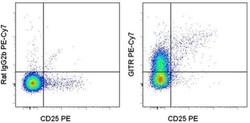Learn More
Invitrogen™ CD357 (AITR/GITR) Monoclonal Antibody (DTA-1), PE-Cyanine7, eBioscience™
Rat Monoclonal Antibody
Supplier: Invitrogen™ 25587482

Description
Description: The DTA-1 monoclonal antibody reacts with mouse GITR, Glucocorticoid-Induced TNFR family gene, also known as TNFRSF18. In naive mice, GITR is expressed predominantly by CD4+CD25+ T regulatory cells (Treg) and by CD25+ CD4+ CD8- thymocytes. Stimulation of GITR with DTA-1 antibody abrogates Treg cell-mediated suppression. Although it does not deplete CD357 expressing cells in vivo, it has been shown to induce tumorogenesis. The removal of GITR-expressing Treg cells or the administration of DTA-1 resulted in organ specific autoimmune disease. Applications Reported: This DTA-1 antibody has been reported for use in flow cytometric analysis. Applications Tested: This DTA-1 antibody has been tested by flow cytometric analysis of mouse splenocytes. This can be used at less than or equal to 0.06 μg per test. A test is defined as the amount (μg) of antibody that will stain a cell sample in a final volume of 100 μL. Cell number should be determined empirically but can range from 10^5 to 10^8 cells/test. It is recommended that the antibody be carefully titrated for optimal performance in the assay of interest. Light sensitivity: This tandem dye is sensitive photo-induced oxidation. Please protect this vial and stained samples from light. Fixation: Samples can be stored in IC Fixation Buffer (Product # 00-822-49) (100 μL cell sample + 100 μL IC Fixation Buffer) or 1-step Fix/Lyse Solution (Product # 00-5333-54) for up to 3 days in the dark at 4°C with mi...
Tumor necrosis factor receptor superfamily member 18 (TNFRSF18), also called GITR or AITR is a protein that in humans is encoded by the TNFRSF18 gene. It is mapped to 1p36.33. This gene encodes a member of the TNF-receptor superfamily. The encoded receptor has been shown to have increased expression upon T-cell activation, and it is thought to play a key role in dominant immunological self-tolerance maintained by CD25 (+)CD4 (+) regulatory T cells. Knockout studies in mice also suggest the role of this receptor is in the regulation of CD3-driven T-cell activation and programmed cell death. Three alternatively spliced transcript variants of this gene encoding distinct isoforms have been reported.
Specifications
| CD357 (AITR/GITR) | |
| Monoclonal | |
| 0.2 mg/mL | |
| PBS with 0.09% sodium azide; pH 7.2 | |
| O35714 | |
| Tnfrsf18 | |
| Affinity Chromatography | |
| RUO | |
| 21936 | |
| 4°C, store in dark, DO NOT FREEZE! | |
| Liquid |
| Flow Cytometry | |
| DTA-1 | |
| PE-Cyanine7 | |
| Tnfrsf18 | |
| Activation-inducible TNFR family receptor; AITR; CD357; GITR; GITR-D; glucocorticoid-induced TNFR-related protein; PRO364; TNF receptor superfamily activation-inducible protein; TNF receptor superfamily member 18; TNFRSF18; Tumor necrosis factor receptor superfamily member 18; tumor necrosis factor receptor superfamily, member 18; UNQ319; UNQ319/PRO364 | |
| Rat | |
| 100 μg | |
| Primary | |
| Mouse | |
| Antibody | |
| IgG2b κ |
Safety and Handling
The Fisher Scientific Encompass Program offers items which are not part of our distribution portfolio. These products typically do not have pictures or detailed descriptions. However, we are committed to improving your shopping experience. Please use the form below to provide feedback related to the content on this product.

